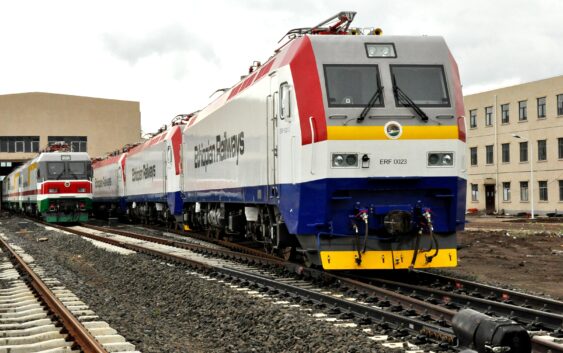- HOW TEMANE-MAPUTO ELECTRICITY TRANSMISSION LINE PROJECT IS GOING THROUGH TEST IN MOZAMBIQUE
- NEWLY OPENED PLASTIC RECYCLING PLANT SET TO HELP COMBAT NAMIBIA's PLASTIC INDUSTRY
- PROGRESS MADE ON PIIM PROJECTS AS OVER 85% COMPLETED IN ANGOLA
- WORLD BANK KICK-OFF INSPECTION OF USMID PROGRAM IN UGANDA
- ALGERIA MINISTER RECIEVED HARBOR ENERGY CEO OVER ENERGY PARTNERSHIP
ETHIOPIA MINISTRY SET TO CONSIDER PRIVATE SECTOR INVOLUEMENT ON RAILWAYS TRANSPORT

Officials at the Ministry of Transport and Logistics are considering permitting private sector participation in railway freight transport as a means to cut market commodity prices.
The Ministry has been conducting feasibility studies to explore the possibility of private sector involvement in rail transportation, including the option of leasing out additional train cars on existing railways.
Dhenge Boru, a state minister for Transport, told The Reporter there has been interest from private firms, who are conducting their own feasibility studies.
Executives at the state-owned Ethiopian Railways Corporation believe private sector involvement can minimize the effects that logistics and transportation hurdles have on commodity prices, which can reach as high as 45 percent of cost, according to government reports.
Railway infrastructure and operators in Ethiopia are owned by the state. The Ethio-Djibouti Standard Gauge Rail Transport S.C, the country’s largest rail transport, is 75 percent owned by the Ethiopian government, while the Djibouti government holds the minority stake.
Three firms won multimodal transport operator licenses earlier this week following a bid that comes as part of the government’s efforts for logistics liberalization. Officials say to expect more of the same in railway services.
“Ethiopia is a huge country, very wide from north to south and west to east. We need to connect all these parts of the country using trains, either by expanding the infrastructure or using existing infrastructure,” said Dhenge.
The State Minister said his office is eager to see private investors take part in the Ethio-Djibouti railway’s activities.
“The Ethio-Djibouti railway can transport up to 10 million tonnes per year, but what it is transporting is way below its potential,” he said. “The goal is to enhance our capacity in train transportation.”
The railway is facing challenges in the form of animal and human obstructions, as well as security issues, according to Dhenge. The problems have forced the rail to stick to speeds as slow as 30 kilometers per hour, pushing its seven-hour journey to a 20-hour crawl.
He disclosed the Ministry has noted interest from private investors, and noted private participation in rail transport is not legally prohibited.
The State Minister disclosed the same could apply for the Addis Ababa Light Rail, which he concedes “isn’t operating well.”
Helina Belachew (Eng.), CEO of the Railway Corporation, observes private investment could benefit the transportation and logistics sector, if investors can meet the huge costs involved.
“Our Corporation would be happy should the government decide to do it. Because building infrastructure, whether by the government or private entities, will minimize the soaring logistics costs at the end of the day,” she said.
Besides enhancing the export and import logistics, Helina believes the private lease of train cars could be a source of income for the government.
“The more they invest, the more the sector will be strengthened,” she said. “It can only be good.”
SOURCE: The Reporter

